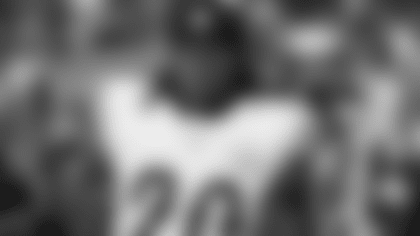On cut-down day, Dick LeBeau, depth
Throughout the 2009 NFL season, Coach Mike Tomlin will provide his insight and observations to Steelers.com on a variety of topics pertaining to the team and the National Football League.
Q. What is cut-down day like for you?
TOMLIN: It's not a good day. It's the worst day of the year, quite frankly. But in another way, it's an exciting day because you have great clarity in terms of who the initial 53 are going to be and you're starting to work with a smaller number of men and really focusing on the challenges that lie ahead.
But at the same time, you're informing some men that they didn't do what they desired to do, what you watched them work for over the course of a number of months. This is not like a lot of jobs. What's required from an effort standpoint, from a commitment standpoint, even to have an opportunity be at the doorstep is special. It's a tough day when you have to inform somebody his journey is over.
Q. How do you handle your end of that conversation?
TOMLIN: Usually what I do is I give them black-and-white information as I see it, what I believe led to the decision. Then I get a feel from them what direction we go. If they need further information to determine what their next step in football or in life is, I'm there to answer that. If there's some disagreement in terms of my decision-making to a degree, I'm there to discuss and talk about that. If they want to get out of the room and move on, I'm open to that. After I say what it is I feel needs to be said, get them the information I believe they deserve, I really get my feel from them in terms of where we go from there.
Q. What do you like best about the group from which you will pick the 2009 Pittsburgh Steelers?
TOMLIN: That we had a lot of tough decisions to make. I've said it repeatedly, but it's very true: We didn't have anybody in deep water at camp. Everybody had a redeeming quality that made him a viable guy, and it continued to play itself out. Every week (since camp opened) we were talking about new people who were distinguishing themselves – at various time it was a guy like Isaac Redman, a guy like Stefan Logan. That showed the depth we were working with, and the quality of the work that (Director of Football Operations) Kevin Colbert and his guys did in bringing those 80 guys to our training cam p.
Q. You have been asked about your opinion of the depth on this roster. One year ago, did you realize you had the depth on that roster to allow the team to withstand several injuries and win a Super Bowl?
TOMLIN: In some areas I did because of my knowledge of players, either here or other place. For example, I knew what Mewelde Moore was capable of doing because I had worked with him in Minnesota. In some areas, I was pleasantly surprised. I was pleasantly surprised with the growth and development of William Gay when we went through stretches where Bryant McFadden was injured, Deshea Townsend was injured. I would imagine it will be a similar outcome issue – some of the people who step up won't surprise me and some of the people will surprise me to a degree.
Q. Does there come a time for a team when you stop trying to work on an aspect of your game and instead start working on ways to compensate for that?
TOMLIN: It's a dual approach. First and foremost, on a week-to-week basis I make the decisions that are necessary for us to win that game. But at the same time, I keep an eye on the big picture and have an understanding that we need to continue to work on and develop areas of our game that are known weaknesses. And not only that, we need to work on elements of our game that hide known or unknown weaknesses. That's something I do on the side, but day-to-day, nuts-and-bolts, I make decisions that are relevant to us winning that week.
Q. Let's go back to 2007 when the Steelers hired you to be the head coach. You obviously knew Dick LeBeau was a talented coordinator, but still you're in the process of putting your first NFL staff together, and to a large degree that staff is going to define you to the point you either get fired or you get a new contract. Did the kind of person Dick LeBeau is go into the decision to keep him?
TOMLIN: My decision to keep Dick LeBeau had more to do with what kind of person he is than what kind of coach he is. This coaching profession, particularly in the National Football League, is a very small fraternity. When someone is really good, either from a coaching standpoint or a teammate standpoint or a personality standpoint, you know it. When someone is really bad, you know it.
Everybody in this business knows the quality of person Dick LeBeau is, and secondly they know the quality of coach he is. There was really no apprehension in terms of having the desire to work with him. More than anything else, it was getting the determination of whether he was interested in sharing my vision and working with me.






